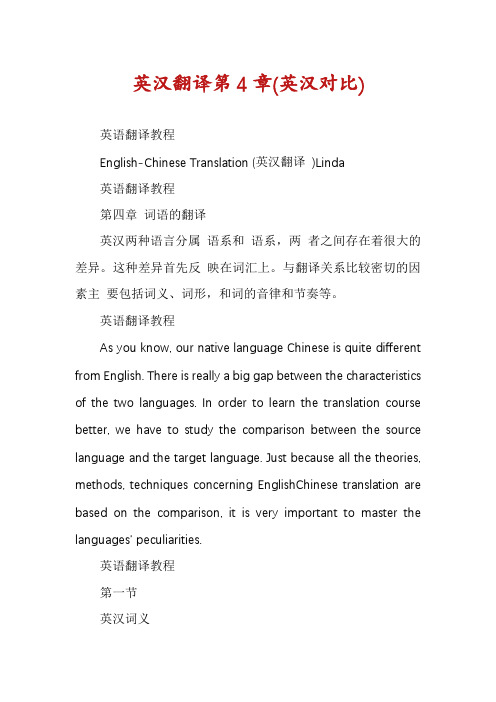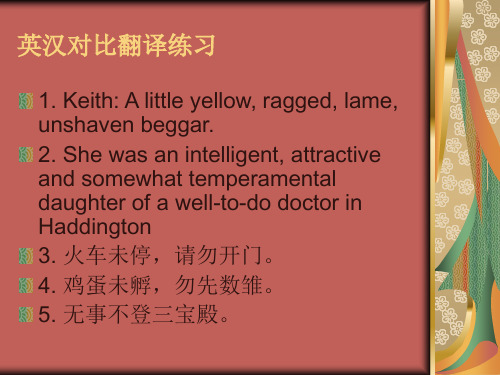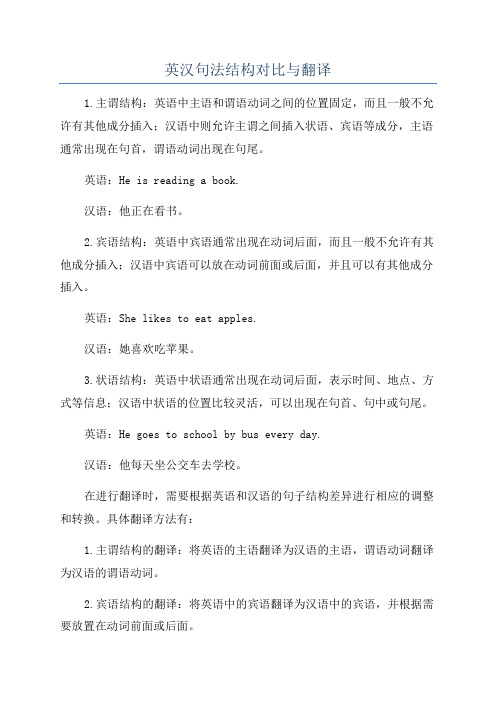汉英比较翻译
左彪-英汉对比与翻译(全)

Two Types of Transfer
• Negative Transfer (负迁移) Errors arise from analogy. 类推会产生错误。 • Positive Transfer (正迁移) Errors decrease by analysis. 分析能减少错误。
We could turn negative transfer (interference) into positive (facilitation) by making analysis on differences between the two languages and arouse the learner‟s awareness of avoiding or reducing errors from analogy. 我们可以通过分析两种语言的差异,提高学生避免 或减少类推错误的意识,把负迁移(干扰)转化为正迁 移(促进)。
人在阵地在。 The position will not be given up so long as we are still living. 人无远虑, If one has no long-term considerations, 必有近忧。 he will find trouble at his doorstep.
English-Chinese Contrast and Translation 左飚
英 汉 对 比 与 翻 译
English-Chinese Contrast and Translation
左 飚
上海建桥学院 上海海事大学 zuobiao212@
欢迎光临
英 汉 对 比 与 翻 译
Chinese
Lacking inflection in the strict sense 缺少严格意义的 形态变化 老师们、同学们 我的爸爸、你的妈妈 认真的态度、 认真地学习
英汉语言对比与翻译作业

英汉语言对比与翻译作业1. It is flattering to believe that they are too profound to be expressed so clearly that all who run may read, and very naturally it does not occur to such writers that the fault is with their own minds which have not the faculty of precise reflection.翻译:认为自己的思想深奥,不可能表达得很清楚,让任何人都能理解,这是一种虚荣的念头。
这样的作家当然不会想到,问题还是出在自己脑子缺乏精确思考的能力。
2. He had a disconcerting habit of expressing contradictory ideas in rapid succession.翻译:他有一种令人不安的习惯:一会儿一个看法,自相矛盾,变化无常。
3.While the present century was in its teens, and on one sunshiny morning in June, there drove up to the great iron gate of Miss Pinkerton’s academy for young ladies, on Chiswick Mall, a large family coach, with two fat horses in blazing harness, driven by a fat coachman in athree-cornered hat and wig, at the rate of four miles an hour. (Thackeray)翻译:(当时)这个世纪刚过了十几年。
英汉语比较与翻译5 形容词

• a mountain village山村 a mountainous village 多山的村庄
• production plan生产计划 productive plan生产效率很高的计划
• 中国专家Chinese expert China expert中国问题专家
形容词作表语和定语时意义的差别
英汉翻译中形容词搭配错误
• 很多大城市的交通越来越拥挤。 • *The traffic in many big cities is getting more and more crowded. • busy/heavy/congested. • • • • 汽车的速度比自行车快多了。 *The speed of a car is much faster than that of a bicycle. higher A car is much faster than a bicycle.
• the late Mr. Smith • 已故的斯密斯先生 • He is late again. • a certain man came to see you. • 有一个人来看你。 • It's quite certain.
• The present chairman comes from America. • All the people present here must sign their names on the document.
• 红榜 • 红娘 • • 开门红
• board of honour/ honor roll • match-maker; go-between • to make a good start; to begin well
• 又红又专
英汉句式对比与翻译

of the total population of the earth, China plays in world
affairs a role that can only grow more important in the
years ahead.
-- Jimmy Carter
Trunk line: S + V + (O) Branches and sub-branches : Adverbials and attributes
• 这样的英语句子,结构显得过于松散了,变成汉式英语而非典型地道的英语句子了。
为什么会这样呢?
• 英汉句子的差异:形合与意合 • 这种差异在翻译中给译者带来一定的障碍。将一个重形合的
语篇译成重意合的语篇,最常见的错误就是将形合的特点迁 移(transfer)到重意合的语言中。 • 翻译中译者面临的困难很多,但句型结构的迁移是最大的障 碍。现在不少译者的译文充斥着英语的句法结构,甚至还美 其名曰“忠实于原文”,这种观念实在有害。
• 英语的结构性就很明显,如:
• It is a curious fact, of which I can think of no satisfactory
explanation, that enthusiasm for country life and love of
• Because there is a great distance and there are not enough transport facilities, the rural world is isolated. This isolation has become more serious because there are not enough information media.
英汉比较与翻译 第七章、英汉动物词比较与翻译

动物词的作用
❖ 刻画人物的习性
❖ old cat(脾气坏的老太婆),dark horse(竞赛中爆冷门的人)
❖ 描摹人物的动作
❖ to monkey(捣蛋),to swan(闲逛)
❖ 模拟人物的声音
❖ bellow(怒吼;吼叫),bark(咆哮;叫骂)
❖ 描写人物的形状
❖ an elephant of a woman(大个儿女人),as ugly as a toad (象蛤蟆一样丑)
❖ 作者借蝉喻人,借蝉言志。这个“蝉”是具 有丰富文化内涵的“象”。在柳永的“寒蝉 凄切,对长亭晚,骤雨初歇”一句中,蝉鸣 代表了悲伤。而英语中的“cicada”也没有承 载如此深厚的文化内涵。
❖ Beaver(河狸)在英语文化中是勤奋的代表。 这种动物在北美很常见,而且它们每天都很 勤奋努力地建房子,不停地工作,所以北美 的人们用eager beaver 来形容那些勤奋努力, 在工作岗位上兢兢业业的人。而在中国这种 动物很少见,所以河狸也就是只能是个名称, 引不起人们的联想。
英汉民族对狐的基本看法是一致的,即“ 坏”;汉 语中多表概念,英语中多指具体的人,而且包括男 女,有褒义有贬义。
❖ 熊 / bear ❖ 1) 英语:粗鲁的人,坏脾气的人,行动笨拙的人;
顽强的人,有特殊才能的人;卖空者 ❖ 2)汉源自:软弱无能;姓,斥骂。英语和汉语对熊
的认识有一定的差异,英语较之汉语,褒义多于贬 义;意义类型也不完全一样。但是意义间也有相互 认同的,例如,用汉语形容“空方占绝对优势的股 市”时候,则说“熊市”。
❖ 复合形容词有eagle-eyed(目光炯炯的),duck-legged(短 腿的),dog-eared(折角的),chicken-livered(胆小的), wasp-waisted(细腰的)
英汉词语的对比与翻译

增补译法
(1) The equipment should enter production in 2000 with first deliveries being made in 2001. (2) The project has been considerably speeded up. (3) According to the U.S. Commerce Department, the United States foreign debt swelled to $ 263.3 billion in 1986, up from $ 111.9 billion in 1985. (4) The purpose of engineering is to create useful goods, to make them better, cheaper and more abundant. (5) Both the buyer and the seller are busy at negotiations of business, contract and draft. (6) A foreign trade staff must have a good foundation in economics, mathematics, statistics, accounting and intercultural communication.源自
(4) The purpose of engineering is to create useful goods, to make them better, cheaper and more abundant. 工程的目的是要创造有用的物品,使他们的质量更好, 价格更便宜,数量更充足。(语义搭配需要) (5) Both the buyer and the seller are busy at negotiations of business, contract and draft. 买卖双方正忙于交易磋商,合约谈判和汇票议付。 (6) A foreign trade staff must have a good foundation in economics, mathematics, statistics, accounting and intercultural communication. 一位外贸人员必须在经济学,数学,统计学,会计学 和文化交际等五个方面具有良好的功底。(增加范畴 词,表概括)
英汉翻译第4章(英汉对比)

英汉翻译第4章(英汉对比)英语翻译教程English-Chinese Translation (英汉翻译)Linda英语翻译教程第四章词语的翻译英汉两种语言分属语系和语系,两者之间存在着很大的差异。
这种差异首先反映在词汇上。
与翻译关系比较密切的因素主要包括词义、词形,和词的音律和节奏等。
英语翻译教程As you know, our native language Chinese is quite different from English. There is really a big gap between the characteristics of the two languages. In order to learn the translation course better, we have to study the comparison between the source language and the target language. Just because all the theories, methods, techniques concerning EnglishChinese translation are based on the comparison, it is very important to master the languages’ peculiarities.英语翻译教程第一节英汉词义英汉词汇之间本身有着很大的差别,这种差别首先表现在词义上。
英国语言学家杰弗里 . 利奇在他的Semantics ( 语义学) 中把最广义的意义划分为7 种不同的类型:外延意义(概念意义)( denotative meaning )、内涵意义( connotative meaning )、风格意义( stylistic meaning )、情感意义( affective meaning )、联想意义( reflective meaning ) 搭配意义( collocative meaning )、主题意义( thematic meaning )。
左彪-英汉对比与翻译(全)ppt课件

Examples of Negative Transfer
5、他建议我接受这个报价。 He suggested me to accept this offer . He suggested that I (should) accept this offer . He suggested my (me) accepting this offer .
Please translate the following:
人到齐就开会。 The meeting will begin when all are here. 不要人云亦云。 Don’t say what others have said. 帐单撕碎了。 The bill was torn to pieces. 问题解决了。 The problem was solved.
Causes: • analogical use of one’s prior knowledge of the mother tongue 母语先知结构的类推运用 • scanty knowledge of differences between the two languages 对两种语言的差异所知甚少 • unconscious falling back on the mother tongue speech habit 不自觉地回归母语的言语习惯
Examples of Negative Transfer
6. -- Your English is wonderful. -- No, no. My English is still poor. -- Your English is wonderful. -- Thank you, but I still need to improve my English. Pragmatic transfer (语用迁移) The negative reply to a compliment is considered in Chinese as modest and courteous. 对赞扬的否定回答在汉语中被视为谦虚有礼貌。
英汉词格对比翻译

metaphor
• Metaphor is an implied comparison between two or more unlike things achieved by identified one with the other • Eg. 1. That lady tries to make sheep’s eyes at her new boss. • 那位女士想向新老板献媚. • Don’t show the white feather to the enemy. • 不要向敌人示弱. • He is a regular oyster. • 他总是守口如瓶. • There is a mixture of the tiger and the ape in the character of a Frenchman. • 虎恶猿狡的性格,法国人兼而有之.
euphemism
• Eg, If you will allow me, I will call your carriage for you. You have lived so long abroad, Mrs, Cheveley, that you seem to be unable to realize that you are talking to an English gentleman. • 译文1:如果你允许,我要请你卷铺盖滚蛋了。谢 佛利太太,你久居国外,看来已经意识不到你自 己是在和一个英国绅士讲话。 • 译文2:如果你允许,谢佛利太太,我要为你叫来 你的马车,请你走人,你已经在国外住的时间太 长,看来已经意识不到自己正在和一个英国绅士 说话。
• 1.Franklin Roosevelt listened with brighteyed smiling attention, saying nothing, and applauding heartily with the rest. • 富兰克林.罗斯福目光炯炯,满脸笑容,聚 精会神得听着;他没说什么,只是跟大伙儿 开心地跟大伙儿开心地鼓掌喝彩。 • 2.They talked to the foreign in hesitant English. • 他们用结结巴巴的英语同那个外国人交谈。
英汉句子比较与翻译

• 英语:end-weight头轻脚重,属于主 语显著(subject-prominent)语言 • It is….to…; there… • 英语重视主语的位置及其统帅全局的作 用。因此在汉译英中,如何找准句子重 心,确定主语常常是翻译成败的关键因 素。
• 汉语:头重脚轻,属于主题显著 (topic-prominent)语言 • 语言学家赵元任:在汉语中,主语与谓 语之间的语法关系与其说是施事和动作 的关系,不如说是话题和说明的关系, 施事和动作可以看作是话题和说明的一 个特例。
• Inadequate training for farmers and the low productivity of many farms place the majority of country dwellers in a disadvantageous position in their own countries. • 农民缺乏训练,许多农场生产率很低, 这就使得大多数农民处于贫穷的境地。
• 英语句子中,名词与介词占优势 英语句子中, • 主谓机制:抓住了谓语动词就抓住了英 语句子的灵魂。 • 名词与名词之间的联系要借介词来串通
• Carlisle Street runs westward, across a great black bridge, down a hill and up again, by little shops and meat-markets, past single-storied homes, until suddenly it stops against a wide green lawn. (7个介词) • 卡莱尔大街往西伸展,越过一座黑色大 桥,爬下山岗又爬上去,经过许多小铺 和肉市,又经过一些平房,然后突然朝 着一大片绿色草地中止了。
中英动物词对比翻译

英汉动物词汇文化对比于翻译一、动物词文化语义不同的原因:1.传统习俗东西方传统的巨大差异导致中英文里动物词汇文化意义的差别。
在中国人眼里,喜鹊是吉祥鸟,它的出现预示贵客来监。
但在英语国家里却是唠叨的象征。
中文里的蝙蝠从古到今都象征福气,而英语文化中却与福无关,甚至有邪恶与憎恶之意,像“as crazy as a bat”(疯得像蝙蝠)与“have bats in thebelfry”(异想天开)。
中国传统文化中的鹤象征长寿,所以有“鹤发童颜”与“鹤寿松龄”等。
英文中长寿的象征却是大象。
中文里凤代表吉祥幸福,也代表用来比喻少见的人才与罕见之物,如“凤毛麟角”。
英语中的凤凰则是复活与永生的代表,如“I believe that a phoenix that rises from its ashes will be even more dazzlingly beautiful.”(我始终相信浴火重生的凤凰将会更夺目。
)英汉两个民族在漫长的社会发展中形成了各自不同的文化传统,源远流长。
英汉文化中的神话传说、历史传统以及宗教信仰等在很大程度上造成了动物词文化意象的不同。
例如,凤凰( phoenix) ,依照Br ewer’s Dictionary of Phrase and Fable的说法, 凤凰是传说中的长生鸟,在阿拉伯沙漠上生存了五六百年,临死前衔草木筑巢,在唱完一首挽歌后用翅膀扇火自焚,然后从灰烬中又诞生出一只新凤凰。
于是,西方文化便取凤凰不死的神性,在英语中赋予其“复活”、“再生”的文化意象。
在汉语传统文化中,因凤凰的神异与美丽人们将其视为吉祥如意的象征,人们赋予了它“吉祥、珍贵、美丽”的文化意象,如“龙凤呈祥”喻指婚姻的完美,“凤毛麟角”表示非常珍贵的东西,以“凤姿”来象征女性的优美等。
在一种文化中提到某些动物时往往可以联想到某特征, 而在另一种文化中却联想不到任何特征。
这种例子, 举不胜举。
英汉语比较与翻译6 代词

• 在表示属于某人的衣物或身体部分时,英语前面常加物主代 词,但同样意思以汉语表示时,“我的”、 “你的 ”之类 词语却往往可省略。 • Hand in your exercises, please. • 请把练习交出来。 • Don’t put your hands in your pocket. • 别把手搁在口袋里。 • I put my hand into my pocket. 我把手放进口袋。 • She listened to me with her rounded eyes. 她睁大双眼,听我说话。
• 4. 在学术报告中,指代作者本人或说话者的第一人称 “我”往往用复数we。
• Now, let’s move to the next points. • 现在,我来谈下一点。
• 5. 当用来指代国家、地球、月亮、船等名词,“它”翻 译成“she”。 • 我们生活在地球上。它又大又美。 • We live on the earth. She is very big and beautiful.
人称代词的习惯表达法
• 1. 电话用语中的习惯表达。
• (1)电话中介绍“我是......”时不能用“I’m ... ”, 而是用“This is ... speaking.”;询问对方时不能用 “Are you ... ?”,而要用“Is that ... speaking?”。 • (2)电话用语中用第三人称代词指说话人自己。 • --Is that you, Lingling? --是你吗,玲玲? • --Yes, she’s speaking. –是我。
• A relative pronoun is a word such as "who", "that", or "which" that is used to introduce a relative clause. "Whose", "when", "where", and "why" are generally called relative pronouns, though they are actually adverbs.关系代词
英汉对比翻译练习

英汉对比翻译练习
19. 吃苦在前,享受在后。 20. 聪明一世,糊涂一时。 21. 有饭大家吃。 22. 不到黄河心不死。 23. 问遍千家成行家。 24. 不打不相识。 25. 敌进我退,敌驻我扰,敌疲我打, 敌退我追。
英汉对比翻译练习
19. Be the first to bear hardships and the last to enjoy comforts. 20. Smart as a rule, but this time a fool. 21. Let everybody share the food if there is any. 22. Until all is over, ambition never dies. 23. Learn from numerous advisers, and you will be a master. 24. Out of blows friendship grows. / No discord, no concord. 25. The enemy advances, we retreat; the enemy camps, we harass; the enemy tires, we attack; the enemy retreats, we pursue.
英汉对比翻译练习
6. When Chou En-lai’s door opened they saw a slender man of more than average height with gleaming eyes and a face so striking that it bordered on the beautiful. 7. To err is human, to forgive divine. 8. 天高云淡。 9. 请勿酒后驾车。 10. 烤羊肉 11. 两个乡干部 12. 鸡不吃了
英汉比较与翻译 第十章 文化意象翻译

• 译文2:宁愿在地狱里为王,也不肯在天堂里 为臣。
• 译文1套用汉语谚语,有失源语韵味,因为原作 宗教色彩极浓。而译文2译作“宁愿在地狱里为王 ,也不肯在天堂里为臣”,这样既揭示了原文的 深层意义,又保留了原文的宗教文化意象,同时 为汉语修辞开拓了新的境界。
• 例4 巧妇难为无米之炊。
他们介绍闪烁中国文化色彩的语言,以及富有 汉民族特点的饮食文化。
文化的意象理解与误解
•
英语中lion是百兽之王,是“勇敢、凶猛、威严”
的象征,英国国王King Richard I由于勇敢过人,被称为
the Lion-Heart。英国人以lion作为自己国家的象征。
The British Lion就是指英国。英语中有许多与lion有关
英汉文化意象比较与翻译
Culture Intention
Ⅰ文化意象的来源与定义 Ⅱ文化意象的理解与比较 Ⅲ文化词汇和意象的翻译
“意象”(image)的定义
• 根据辞海的解释,意象是表象的一种,简 单地说,意象就是寓“意”之“象”,就 是用来寄托主观情思的客观物象。意与象 是契合为一,意始终不脱离感性对象而存 在,象存则意可依托,象变则意变,象亡 则意无所依附。
• 文化意象的失落表现在两个方面:西方译入语中 无对应文化意象而导致意象失落;中西习语或成 语的独特性和典型性引起文化意象的失落。
•
例2 欲去牵郎衣,郎今何处?不恨归来迟,莫向临邛
去!(孟郊《古别离》)
•
译文:You wish to go,and yet your robe I hold. Where
文化意象的错位(nonequivalence of culture-loaded image)
英汉句法结构对比与翻译

英汉句法结构对比与翻译
1.主谓结构:英语中主语和谓语动词之间的位置固定,而且一般不允许有其他成分插入;汉语中则允许主谓之间插入状语、宾语等成分,主语通常出现在句首,谓语动词出现在句尾。
英语:He is reading a book.
汉语:他正在看书。
2.宾语结构:英语中宾语通常出现在动词后面,而且一般不允许有其他成分插入;汉语中宾语可以放在动词前面或后面,并且可以有其他成分插入。
英语:She likes to eat apples.
汉语:她喜欢吃苹果。
3.状语结构:英语中状语通常出现在动词后面,表示时间、地点、方式等信息;汉语中状语的位置比较灵活,可以出现在句首、句中或句尾。
英语:He goes to school by bus every day.
汉语:他每天坐公交车去学校。
在进行翻译时,需要根据英语和汉语的句子结构差异进行相应的调整和转换。
具体翻译方法有:
1.主谓结构的翻译:将英语的主语翻译为汉语的主语,谓语动词翻译为汉语的谓语动词。
2.宾语结构的翻译:将英语中的宾语翻译为汉语中的宾语,并根据需要放置在动词前面或后面。
3.状语结构的翻译:将英语中的状语翻译为汉语中的状语,并根据需要放置在句首、句中或句尾。
需要注意的是,不仅要考虑句子结构的差异,还要考虑语言的习惯表达方式和上下文的语境。
对于复杂的句子结构和长篇文章的翻译,还需要进行更加细致的分析和翻译。
英汉语比较与翻译6 代词

• 在照应这一手段中,英汉语篇最显著的差别是:英 语有关系代词,而且使用频率很高;而汉语没有关 系代词,因此在很多情况下,汉语中的人称代词在 译文中常常可以用英语中的关系代词表示。如:
• 这张条子是安娜留的,她刚才到这儿来过。 • This note was left by Anna, who was here a moment ago.
• There is no doubt about it; you are the student who impressed me deeply. (cataphora) 下指/后指
• According to their meanings, adverbial clauses can be divided into nine kinds. (cataphora) 下指/后指
• 2. 询问敲门人“你是谁”时,由于不明对方身份, 用it。 • --Bang bang bang! (Knocking at the door) • --Who is it? (“it”指“你”) • 3. 劝吃东西时用自身代词。例如: • 请你随便吃些蛋糕吧。 • Help yourself to the cakes.
• 代词可以代替短语、句子,甚至一大段话语表达的意思。 它 能指代人物、时间、地点、数量、程度和事件。 • Your spoken English is excellent; I will not forget it. (anaphora) 前指 • I gave my wife a fur coat for her birthday, which pleased her a lot. (anaphora) 前指
• 3. 在成人和孩童、医生和患者之间的对话中,成人、 医生常用we来称呼孩童、病人,表示“你”。 • (幼儿园阿姨对小朋友)How are we this morning? 今天早晨你好吗? • (医生对病人) Can ’ t we open our mouth a little wider? 你嘴巴再张大一点好吗? • (琴师对学生) Shall we play the tune once more? 你再弹一下这个调好吗?
- 1、下载文档前请自行甄别文档内容的完整性,平台不提供额外的编辑、内容补充、找答案等附加服务。
- 2、"仅部分预览"的文档,不可在线预览部分如存在完整性等问题,可反馈申请退款(可完整预览的文档不适用该条件!)。
- 3、如文档侵犯您的权益,请联系客服反馈,我们会尽快为您处理(人工客服工作时间:9:00-18:30)。
3. Hypotactic vs. Paratactic 形合与意合
In English, clauses or phrases are coordinated with or subordinated to one another syntactically while in Chinese they are placed one after another without coordinating connectives. a. The many colors of a rainbow range from red on the outside to violet on the inside. 彩虹有多种颜色,外圆红,内圈紫。 b. He had a disconcerting habit of expressing contradictory ideas in rapid succession. 他有一种令人难堪的习惯:一会一个看法,自相矛盾,变化无常。 c. The present onslaught of vehicles poses a serious threat to urban life and pedestrian peace of mind. 车辆横冲直撞,严重地威胁着城市生活,路上行人无不提心吊胆。
在美国有一个根深蒂固的观点,即只有那些抚养的起子女的人,才应 该鼓励生育。 C. Although lonely in a new land, he was described by his fellow workers and students as cheerful, of a friendly nature, honest, and modest. 虽然他单身一人,又处在异乡客地,但正如他的同事和学生描述的那 样,他为人愉快开朗,温文尔雅,诚实谦虚。
Differences between English and Chinese Languages from a Macroscopic View Point
英汉语言宏观比较
1. Synthetic vs. Analytic综合性与分析性
English is a synthetic language marked with inflections, while Chinese is an analytic language, with the inflection implied in the context, or by using auxiliary words such as "的、地、得”, “着、了、过”etc. For example: a. During the war time, years like these would have meant certain death for many people. Many would have become beggars and others would have been compelled to sell their children. 战争期间碰到这样的年景,很多人肯定会死去,很多人会逃荒要饭,很多人 会被迫卖儿卖女。 b. Thus encouraged, they made a still bolder plan for the next year. 由于受到这样的鼓励,题目为第二年制定了一个更大胆的计划。 c. But for many, the fact that poor people are able to support themselves almost as well without government aid as they did with it is in itself a huge victory. 但在许多人看来,穷人现在能不依靠政府救济养活自己,而且过得几乎和过 去依靠政府救济时一样好,这件事本身就是一个巨大得胜利。
2014-6-18
5. Impersonal vs. Personal 物称与人称
There are more impersonal structure used as the subject in English than in Chinese, as shown in the following example: a. 你出了什么事儿啦? What has happened to you? b. 我突然想到一个主意。 An idea suddenly struck me. c.我们没有听到任何声音。 Not a sound reached our ears. d. 他们欣喜若狂。 A great elation overcame them. e. 她终于明白了真相。 The truth finally dawned on her. f. 他开始变得惊恐万状。 Alarm began to take entire possession of him.
2014-6-18
人造材料通俗称为合成材料。许多人造材料正在代替某些天然材料, 这或者是由于天然材料的数量不能满足日益增长的需要,或者是由于 人们选择了合成材料的一些物理性质并加以突出而造成的。因此,合 成材料在其应用领域将具有极大的用途。
2014-6-18
b. I see advancing upon all this in hideous onslaught the Nazi war machine, with its clanking, heel-clicking, dandified Prussian offices, its crafty experts agents fresh from the cowing and tying down of a dozen countries. 我看见纳粹的战争机器向他们碾压过去,穷凶极恶地展开了屠杀。我 看见全副戎装的普鲁士军官,腰间的刀剑锵锵 有声,脚下的军靴咔咔 作响。还有那些刚刚威吓、压制过十多个国
g. 我兴奋的说不出话来。 Excitement deprived me of all power of utterance. h. 她独处时感到一种特别的安宁。 A strange peace came over her when she was alone. i. 我走在厚厚的地毯上,一点脚步声都没有。 The thick carpet killed the sound of my footsteps. j. 一踏上中华人民共和国国土,我们就随时受到关怀和照顾。 From the moment we stepped into the People's Republic of China, care and kindness surrounded us on every side.
2014-6-18
7. Static vs. Dynamic 静态与动态
English is static, with agent nouns being repeatedly used to replace verbs, while Chinese is dynamic, with more verbs being used in a single sentence. For Example: a. 他能吃能睡。/ 他吃的饱,睡的香。 He is a good eater and a good sleeper. b.你一定不善于学习,要不然就是教你的人很不会教。 You must be a very bad learner; or else you must be going to a very bad teacher. c.计算机比人检查的更细心,更勤快。 The computer is a far more careful and industrious inspector than human beings.
2014-6-18
6. Passive vs. Active被动与主动
As we have mentioned in the previous units, the passive voice is extensively used in English, while Chinese is prone to active structure. For example: a . A few years ago it was thought unusual that programs could ever be called up by viewers to be displayed on their TV screens at home.
2014-6-18
2. Compact vs. Diffusive紧凑与松散
English sentences are compact, i.e. tightly combined with connectives or prepositions, while Chinese is diffusive , i.e. loose in structure. a. Now the integrated circuit has reduced by many times the size of the computer of which it forms a part, thus creating a new generation of portable minicomputer. 现在集成电路成了计算机得组成部分,使计算机的体积大大缩小,从 而产生了新一代得便携式微型计算机。 b. A notion has taken hold in the U.S. to the effect that the only people who should be encouraged to bring children into the world are those who can afford them.
